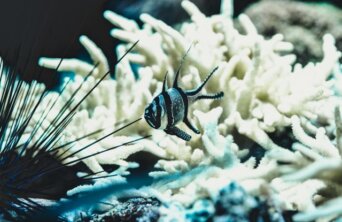- About
- Topics
- Picks
- Audio
- Story
- In-Depth
- Opinion
- News
- Donate
- Signup for our newsletterOur Editors' Best Picks.Send
Read, Debate: Engage.
| topic: | Conservation |
|---|---|
| located: | Philippines, China |
| editor: | Wincy Ng |
The Philippines accused Chinese fishermen of using cyanide at the Scarborough Shoal in the disputed South China Sea, bringing up concerns about destroying the ecological environment and natural resources.
The Philippines' Bureau of Fisheries and Aquatic Resources (BFAR) spokesperson accused China of illegally using cyanide to "intentionally destroy (the environment) to prevent Filipino fishing boats from fishing in the area." According to the BFAR spokesperson, the estimated damages will be around $18 million.
"It is deeply concerning, and we will be validating and investigating, " stated the Bureau.
Global Times, a Chinese state-owned media, refuted the accusation and blamed the Philippines for the destructive fishing practice, pointing out that the Philippines is the major country practising cyanide fishing worldwide.
Regardless of who the destroyers are, cyanide fishing is an illegal and harmful way to capture live reef fish for the aquarium trade. It began in the 1960s in the Philippines and expanded to Southeast Asia, mainly by small operators to apply the chemical compound to a stretch of reef.
Although cyanide fishing is a quick way to catch fish, it harms living coral by killing its polyps and algae, transforming coral reefs from ocean rainforests to marine deserts.
"A square metre of reef is destroyed for every live fish caught using cyanide," says biologist Sam Mamauag of the International Marinelife Alliance (IMA).
As part of the South China Sea, the Scarborough Shoal region has enormous natural resources, including rich fishing grounds, oil, and gas.
There are almost 3,000 native and migratory fish species in the South China Sea, nearly 12% of the world's total fish harvest. The area is also home to some of the most biodiverse reef systems in the world.
The study notes that China and the Philippines are competing over sovereignty in the region to serve national food and energy needs and for national pride.
China seized Scarborough Shoal from the Philippines in 2012, and both countries claimed their sovereignty and patrol rights. Last year, two countries' ships almost caused collisions close to Second Thomas Shoal, which also lies within Manila's Exclusive Economic Zone (EEZ).
As both countries fuss over the maritime territorial dispute in Scarborough Shoal, the consequence of cyanide fishing is increasingly evident. There can be no winner if we continue to use it at the cost of destroying the ocean.
Image by milan degraeve.

